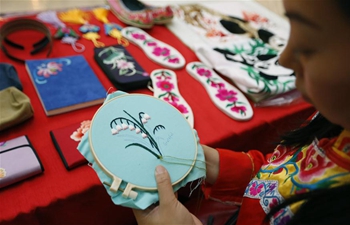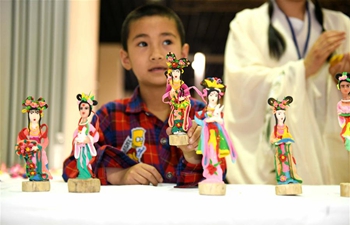CHENGDU, May 19 (Xinhua) -- Inside a shopping mall in Chengdu, capital of southwest China's Sichuan Province, a restaurant serving Japanese food is full of customers.
"When I opened the restaurant seven years ago, there were just a few similar restaurants in the vicinity, now there are almost 40," said the restaurant owner Li Yun.
Japanese cuisine has gained popularity in China in recent years, according to a Japanese trade agency.
Restaurants selling Japanese food in China increased from about 10,600 in 2013 to 40,800 in 2017, according to the Japanese External Trade Organization (JETRO).
By the end of 2017, Guangdong, Jiangsu and Shanghai had the highest number of Japanese restaurants.
Despite a growth slowdown in first-tier cities in recent years, Japanese restaurants saw rapid expansion in second- and third-tier cities, indicating that Japanese cuisine has been spreading to more areas in China, according to JETRO.
China's booming overseas tourism might be one of the reasons behind such growth. An increasing number of Chinese visitors to Japan have tasted Japanese food, and expect to enjoy the cuisine when they come back to China, which is partly why the restaurants expanded so rapidly, according to the agency.
"In the past, it was hard to find suppliers of raw materials for Japanese restaurants in Chengdu, and I had to purchase from big cities like Shanghai," Li recalled. "But now, there are about seven suppliers in Chengdu."
Li said during the early days, there was only one table of Chinese guests, and the rest were mostly Japanese visitors traveling or doing business in Chengdu.
"Now the proportion has completely reversed," he said.
The low-fat, low-salt and low-oil Japanese food has quickly catered to the demand among the Chinese public to eat healthy, said Chen Bifeng, who has served as a Japanese chef in Chengdu for 23 years.
"The food culture is becoming more diverse as China's economy grows," Chen said.
According to a report released by the China Hospitality Association, the revenue of China's catering industry reached almost 4 trillion yuan (583 billion U.S. dollars) in 2017, a year-on-year increase of 10.7 percent.
"Japanese food is tasty and healthy, and the exotic elements in the restaurants such as sakura decoration are quite appealing," said Xia Siyuan, who frequents Japanese restaurants.
"I see huge potential for Japanese restaurants here," Li Yun said. "I plan to open another one in Chengdu."

















